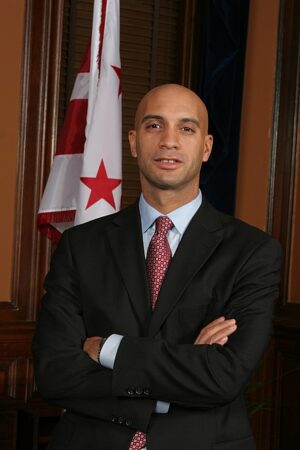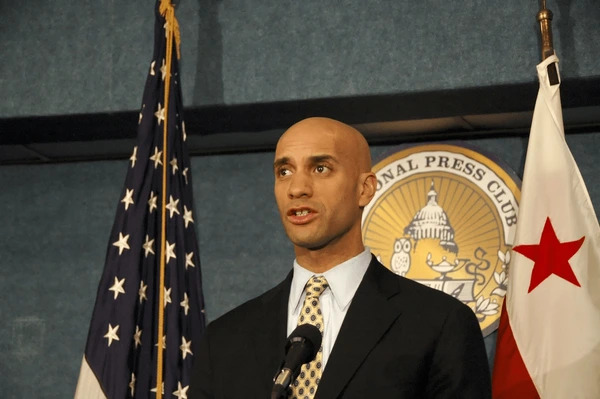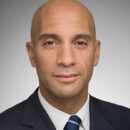Adrian Fenty has had an unconventional career trajectory. He started out in law before shifting to government and ultimately becoming mayor of Washington, D.C. Then, after his first mayoral term ended, he reinvented himself by founding his own venture capital firm, MaC Venture Capital.
I’ve known Adrian for over a decade and have the fortune of having him as an investor in my company. The 53-year-old divides his career into “three lives”: working at his parents’ triathlon store, a decade-long political career, and Silicon Valley. It would be easy for an outsider to dismiss the importance of this first retail gig, but Fenty would disagree.
“I learned from my family, who took out a second mortgage to become entrepreneurs,” he says. “And I learned so many things about sales and product and marketing and everything else by working at my parents’ store.”
But it would take a few years for things to come full circle.

Fenty graduated from Howard University Law School
A LEANING FOR LAW
In high school, Adrian became enamored with lawmaking and set his sights on becoming a legislator. This idea solidified during his undergraduate years after he interned with Ohio senior Senator Howard Metzenbaum, working with a committee of lawyers helping to write labor legislation.
After graduating from Oberlin, he deferred his education for one year before starting law school at Howard University. With a second degree under his belt, the first thing he did was volunteer on Capitol Hill. There, he worked with Joseph Kennedy, a congressman from Massachusetts (who also happened to be Robert F. Kennedy’s eldest son).
Although Adrian had another job at a small law firm, it was clear where his heart lay.
“I would work at the law firms, these two small law firms, until 5 or 6pm,” he says, “then I would go over and volunteer on this person’s campaign who was running for mayor.”
Although the mayoral candidate came in second in the race, Adrian’s participation turned out to be a crucial moment in his career. Two years later, a seat in the same ward became open, and Fenty decided to run for it himself.
“It was a real David and Goliath situation” he says. “The woman I ran against had been in office for 21 years and was the chair of the economic development committee. That’s kind of like being the Chair of Ways and Means in the House of Representatives.”
Despite the odds, Adrian was determined to take a stand against career politicians, saying he wouldn’t forgive himself if he didn’t give it a shot. Incredibly, he was successful, winning 57% of the vote in the all-important primaries.
BUILDING GRASSROOTS SUPPORT
Adrian’s campaign was a grassroots movement from the get-go, with his success made possible thanks to the basics: knocking on doors to build up name recognition and asking supporters to put signs in their yards.
He applied this same approach once he started the position, taking what he describes as a populist approach to the city council.
“I had a theory that, if I did a really good job in the ward I represented that would be the best way to convince the other seven wards in the city that I could be a good elected official,” he says.
It turned out he was onto something—because when he stood for reelection four years later, nobody ran against him.
Since Adrian was the youngest member in his council, he didn’t get a committee (committees are assigned based on seniority). While many would see this as a negative, it gave him free time. So, instead of running a committee, he dipped his toes into everything.
“I treated my district as my committee,” he says.
If anything happened in his ward, he would be there and ready to help, whether trimming trees or installing stop signs.

Fenty as Mayor of D.C.
NEXT STOP: MAYOR
There was so much momentum after this initial win that everything was falling into place perfectly for a leadership bid. Adrian was already considering a bid for mayor when the incumbent mayor announced that he wasn’t going to run. It was the perfect opportunity.
Adrian took a similar approach to his previous campaign, knocking on doors and putting up signs everywhere to create a grassroots movement.
Once again, it was a victory: Out of 142 precincts in DC, Adrian won every single one.
As anyone familiar with Adrian’s track record would expect, he dove in headfirst to being mayor with a bold approach.
“I literally went from being an aggressive board member legislator to being the CEO,” he says. “I never really thought of myself as anything except the CEO of the city.”
Taking inspiration from the private sector and trailblazers like John F. Kennedy, Adrian focused on using technology and hiring the very best people for his team.
He also turned his focus to education, enlisting the help of education advocate Michelle Rhee. “We wanted to make D.C. an example of how you can turn around a school system so that others would emulate it,” Fenty says.
While Adrian was popular with many, his innovative approach was divisive. He failed to be elected for a second term, losing 53 to 47 to the chair of the city council.
Others in his position may have sought political positions elsewhere. But Adrian knew it was time to do something else.
VENTURING INTO VC
By the end of Adrian’s term in office, he had developed a reputation for his involvement in education. This led to a role as a consultant for Rosetta Stone and another edtech firm called Everfi. The Washington Post wrote about him taking the positions, which spread the word about Fenty’s involvement in tech.
This brought opportunities to speak in Silicon Valley, and one day, he was introduced to renowned investor Marc Andreessen, who offered him an advisor role at Andreessen Horowitz. The fund was still in its early days, offering a unique insight into VC—and Fenty soon took to the fast-paced, disruptive industry.
“I literally heard the Oculus pitch and the Lyft pitch … these companies that became multibillion-dollar companies,” he says.
“I heard them when they were pitching for their Series A. And it taught me so much.”
While Adrian’s position wasn’t full-time, he treated it like it was in order to make the most of the opportunity; he held the job for more than four years. One day, he realized he had accumulated enough knowledge and met enough people to launch his own small fund.
But rather than turning to a contact from his time working in VC, one of the most important figures turned out to be one of Fenty’s old fraternity brothers, Charles King. After graduating, King became a successful Hollywood agent and started his own media company, and Fenty discovered that King’s next plan was to start a VC fund.
They joined forces with Mike Palank, who had been working at King’s previous media company, and the three of them worked on two $10 million funds. This provided a proof of concept, and the trio went on to merge with Marlon Nichols from Cross Culture Ventures. Nichols was a solo GP at the time, and all three men saw the benefits of growing their team, so they created a joint venture consisting of three full-time LPs and one VP.
This is when things really got off the ground, with the team raising a $111 million fund.
It wasn’t an instant success, with the pandemic stalling efforts. But after a few months of inactivity, the market started to move fast. “Our LPs were telling us, listen, we’ve got people coming back into the market who just closed their fund a year ago,” Fenty says. “There were people raising, $2 billion, $3 billion, $4 billion funds who had just raised the fund a year ago.”.
Shortly after closing the initial $111 million fund, the firm closed a second fund of $203 million.
SWING FOR THE FENCES
Silicon Valley and Capitol Hill might seem worlds apart, but Adrian’s focus on grassroots efforts and building a good reputation remained consistent. Fenty applied the same hands-on approach he used as a legislator to his VC work, aiming to help his companies succeed so those founders could later vouch for him.
“We are one of the first funds to grow up in the era where that was the norm, where you didn’t just invest, but you’d help,” Fenty says. “What that does for a seed fund like ours is our network speaks really loud about how much we work with our companies. And so that helps us get deals.”
Fenty also recognized the importance of hiring the right people in both manifestations of his career. “Never settle for someone who’s less than an A+—that’s really important,” he says. “Being willing to swing for the fences, to take huge risks on having a founder who also is going to hire great people. All of those things were things that I was really focused on when I was in office.”
Outside of work, Adrian has completed at least 60 triathlons and almost always medaling. Adrian’s story is a powerful reminder of how hard work and a tenacious drive for excellence can propel a person to succeed in diverse fields.
Nanxi Liu is Co-CEO and Co-Founder of Blaze.tech, a fast growing platform that enables organizations to build apps and tools without writing any code. Nanxi also co-founded Nanoly Bioscience, a venture-backed biotech company that develops polymers to eliminate refrigeration for vaccines and therapeutics.














































